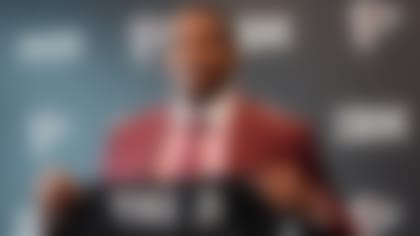NFL teams had until 4 p.m. ET Tuesday to apply the franchise tag. As the dust settles following the deadline, Gregg Rosenthal breaks down the ramifications of who was tagged -- and who wasn't.
The players set free were the most fascinating part of franchise tag deadline day. Safety Landon Collins, one of the best Giants draft picks of the decade (selected in the second round in 2015), doesn't have a future with the team. Trey Flowers is the ultimate Patriot in so many ways, yet the team is clearly wary of setting his value. Ravens linebacker C.J. Mosley is a four-time Pro Bowler and the beating heart of one of the league's preeminent defenses, but the high tag number at his position forced Baltimore to play a risky game of chicken. They all rank in the top seven of our evolving list of the top 101 free agents on NFL.com.
Collins is the least likely player of the trio to return his team, and he's the trickiest player to value. Giants general manager Dave Gettleman famously rescinded the tag that had been placed on cornerback Josh Norman when Gettleman was in Carolina, and Gettleman expressed caution last week about keeping Collins against his will under the terms of the tag. Known as a leader and ferocious competitor, Collins expressed appreciation to the Giants for his time in New York on Tuesday. I suspect part of that gratitude comes from the knowledge that he can score a much better deal on the open market than the $11.15 million franchise tag number for safeties. How much better is anyone's guess.
The safety market was depressed last offseason for unclear reasons in a league where everyone needs a ballhawk. The problem for Collins remains that his coverage skills aren't the strength of his game. He's at his best near the line of scrimmage and needs a defensive coordinator who can use him creatively in a variety of disruptive ways.
Earl Thomas' centerfield skill set, however rare, is more conventionally attractive to teams in this passing era. Thomas and Collins figure to do just fine next week when free agency kicks off, but the crop of available safeties is remarkably deep, including Tyrann Mathieu, Lamarcus Joyner, Adrian Amos, Ha Ha Clinton-Dix, Kenny Vaccaro and the newly released Eric Weddle.
Perhaps Collins just didn't fit with Giants defensive coordinator James Bettcher, who could potentially want to team up with Mathieu again after their time together in Arizona. Still, there's likely something offputting to Giants fans about watching a homegrown star leave when Gettleman gave too much money to left tackle Nate Solder last offseason and traded multiple draft picks for inside linebacker Alec Ogletree, whose contract included guaranteed money for 2019 and will count for $11.75 million against the cap, per Over The Cap. The Giants are also expected to cut or trade pass rusher Olivier Vernon, a big-ticket free agent signing from 2016 who struggled to stay healthy. If they move on from Vernon and Collins, the Giants will be getting rid of two playmakers in their 20s while paying huge money for mediocre play from Eli Manning and Solder. Long seen as one of the league's most stable franchises, the Giants have lately seemed like an organization that has a hard time coming up with a clear plan for its future, much less sticking to one.
Mosley and Flowers stuck in between
Keeping Collins at his tag number appeared like it would have been easy enough. The same was not true for Mosley and Flowers, largely because of what doing so would mean for long-term contract negotiations.
The franchise tag for linebackers was announced Tuesday at $15.443 million, a figure more appropriate for a pass rusher than an inside linebacker. New Ravens GM Eric DeCosta has repeatedly stressed keeping Mosley as a priority, and I believe him. But the highest inside linebacker contract in the NFL -- Luke Kuechly's with the Panthers -- averages $12.3 million, while Bobby Wagner's deal with the Seahawks is worth under $11 million per year. Mosley doesn't play at the level of those two, who will both one day be debated for entry into Canton. But those contracts are now four years old, and Mosley's representatives can make a strong inflation-based argument, given that he's the next star-type linebacker to hit free agency. Even if Mosley tops Kuechly's deal, setting the baseline at over $15 million per year didn't make sense. NFL Network's Mike Garafolo reports the Ravenswill continue to work to re-sign Mosley, and that's exactly what I'd bet will still happen. Mosley's value is greater to the Ravens than it is to any other team.
The same may not be true for Trey Flowers and the Patriots, because teams around the league know how much he could help them. He's been one of the NFL's most underrated defensive players since he was drafted, often mislabeled as an edge rusher when he plays inside and out, at his most effective as a 3-4 defensive end or 4-3 defensive tackle. Flowers' flexibility and knack for disruption help explain why the Patriots are so adept at changing their gameplan seamlessly from week to week.
NFL Network's Mike Giardi reports that the Patriots want Flowers to test his value on the market before they make an attempt to keep him. They took a similar approach with Devin McCourty in 2015 and Dont'a Hightower in '17, and both players ended up re-signing; the two veterans remain on the books with big salaries. The tactic is less likely to result in a deal with Flowers this time around. NFL Network Insider Ian Rapoport reports Flowers could earn close to $17 million per season, which is right around the franchise tag number for defensive ends. If the Patriots weren't willing to pay Flowers that money on a one-year deal via the tag, it's unlikely they will match another team's offer. For a team that has struggled to develop homegrown defensive stars, letting Flowers go at age 26 is a risk. But no team sets an internal price and sticks to it quite like the Patriots. Just ask Richard Seymour, Ty Law, Asante Samuel, Chandler Jones, Jamie Collins and Malcolm Butler.
A sign of the times
One day after the Buccaneers were reported to be tagging tackle Donovan Smith, Rapoport reported that the Bucs signed him to a three-year contract worth $41.25 million. It's safe to say this did not worry the rest of the NFC South, especially Saints pass rusher Cameron Jordan.
Smith is one of those players whose own team speaks highly of him, even while he fails every eye test. Pro Football Focus has ranked Smith as one of the 11 worst tackles in football for four straight seasons, but he hasn't missed a snap. This contract is a reminder that it's extremely difficult to find left tackles, to the point that front offices are acting scared about starting over at the position. GM Jason Licht also could be guilty of overrating his own picks; Smith was taken in the second round in 2015, in Licht's second year on the job.
The biggest surprise of the expected moves
So who was tagged? The complete list is basically a who's who of pass rushers ... and 49ers kicker Robbie Gould. DeMarcus Lawrence (Cowboys), Jadeveon Clowney (Texans), Frank Clark (Seahawks), Dee Ford (Chiefs) and Grady Jarrett (Falcons) were all given the franchise tag in moves that decimated the top of our free agent list.
The only real surprise in that group was the news from Rapoport that Ford could also be traded. While the Chiefs should be willing to carry Ford for one season, that they're dangling him as trade bait is a sign the team doesn't see him fitting in defensive coordinator Steve Spagnuolo's 4-3 defense long term. RapSheet threw out a second-round pick as possible compensation, which sounds fair for a pass rusher coming off a truly dominant season.
Ford's up and down career could complicate matters, however; he's struggled with injuries, and the 2018 contract year came out of nowhere for the former first-round pick, aside from a brief stretch of excellent play in 2016. Teams aren't supposed to use the tag as a precursor to a trade, an issue that Ford's representation could potentially raise with the league if they don't like where he may be dealt. There's also a chance that Ford and Clowney could resist being given the linebacker tag designation (worth $15.44 million) rather than defensive end ($17.13 million), but that's a nerdy conversation for another day.
Tuesday's news was all about the star players who are available, and Ford appears to remain on that list, even after being tagged. It'll just cost a draft pick and an expensive contract to obtain him.
Follow Gregg Rosenthal on Twitter @greggrosenthal.












